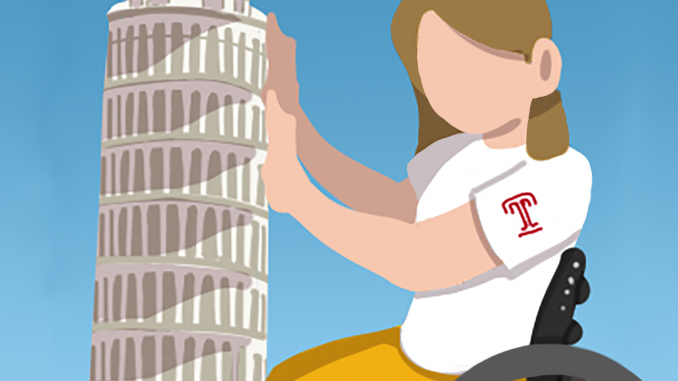
Alexis McKenney, a health and rehabilitation sciences professor, led a new study abroad course about disability identity during the Summer II semester through Temple Rome.
The course Disability Identity in Contemporary Society provides students with opportunities to learn about issues surrounding disability and accessibility in an international context. The program teaches the challenges people with disabilities experience while traveling abroad and at tourist destinations.
This program was designed to be done overseas as an immersive experience, and through her research, McKenney saw students’ attitudes shifted from a sympathetic to an empathetic response.
“What became more important is they turn into advocates,” she added. “And the other thing is we’re doing them in cities that are extraordinarily challenging.”
Marina Salvatore, a senior speech pathology major, was one of the 12 participants in the program.
One night the group had a “silent dinner,” a simulation about communicating with a hearing impairment. It was created by two of McKenney’s former students who are deaf.
“The waiters and waitresses had to work with us to try to get our order and it was just a really frustrating experience, but it also made me realize that there are things that we can work toward to help people who are deaf or hard of hearing in certain situations,” Salvatore said.
During dinner, one of the former students FaceTimed McKenney and Salvatore wanted to converse with him using American Sign Language. She was able to ask McKenney in writing as the restaurant had paper table cloths.
“It was just a super cool experience because it was the first time I ever really got to sign with a deaf person,” she said.
McKenney noted this experience as one of the most poignant moments of the trip.
“I held the phone up while the two of them had a conversation and the rest of the class gathered around and thought this was the greatest thing ever,” McKenney said. “They were actually getting to talk to somebody who facilitated this and actually has a disability.”
McKenney was amazed as this was the first class to suggest making the activity last an entire day instead of one dinner. Students suggested avoiding choosing restaurants with paper tablecloths, making students communicate without pencils and pens.
“They were able to see where it needed to be even tougher for them to grasp what the challenge was for,” McKenney said.
Brooke Dutton, an occupational therapy graduate student, said the class experienced accessibility issues with wheelchair lifts, ramps to restaurants, handicap parking and the cobblestone lining parts of the city.
During a wheelchair simulation, the class went to the Spanish Steps but the wheelchair lift was out of service. After asking for assistance and finding no solution, the class carried the wheelchairs up the stairs, Salvatore said.
“It really hit home for me to see how hard it could be just traveling to these places and not having equal opportunities for everyone,” Dutton said. “It’s one thing to talk about it. It’s another thing to experience it.”
This program gives students a “trained eye” in thinking about people in wheelchairs going through flooded curb cuts when it’s raining, or noticing a restroom at their job only meets the basics of the Americans with Disabilities Act, McKenney said.
Although there are barriers, McKenney wants to see more students with disabilities not only pursue her program but to also study abroad.
The first thing she did when she started working at Temple in 2018 was meeting with the Department of Education Abroad and Overseas Campuses and Disability Resources and Services about accommodating students.
“My suspicion is that students with disabilities, particularly if they’re going to need an interpreter or they’re blind, or they need to bring a wheelchair, a lot just think ‘I’m not going to bother,’” McKenney said.
Salvatore described the experience as “eye opening” and encourages any student to participate in the program.
“This trip really lit a fire inside of me. You can do something about it even though you’re just one voice. You can rally people around you either in your class, your program or in your profession,” Dutton said.



Be the first to comment